pep小学英语六年级英语动词过去式
一般过去时(讲义)-人教PEP版英语六年级下册
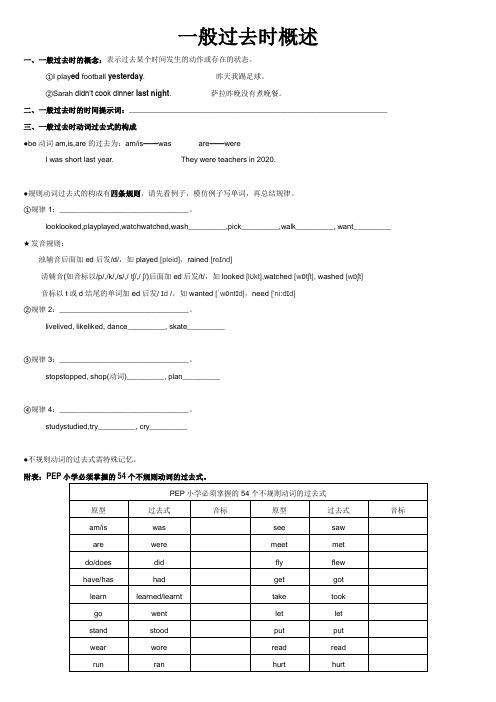
一般过去时概述一、一般过去时的概念:表示过去某个时间发生的动作或存在的状态。
①I play ed football yesterday. 昨天我踢足球。
②Sarah didn’t cook dinner last night. 萨拉昨晚没有煮晚餐。
二、一般过去时的时间提示词:______________________________________________________________三、一般过去时动词过去式的构成●be动词am,is,are的过去为:am/is——was are——wereI was short last year. They were teachers in 2020.●规则动词过去式的构成有四条规则,请先看例子,模仿例子写单词,再总结规律。
①规律1:_______________________________。
looklooked,playplayed,watchwatched,wash_________,pick_________,walk_________, want_________ ★发音规则:浊辅音后面加ed后发/d/,如played [pleid],rained [reɪnd]清辅音(如音标以/p/,/k/,/s/,/ tʃ/,/ʃ/)后面加ed后发/t/,如looked [lʊkt],watched [wɒtʃt], washed [wɒʃt]音标以t或d结尾的单词加ed后发/ɪd /,如wanted [ˈwɒntɪd],need ['ni:dɪd]②规律2:_______________________________。
livelived, likeliked, dance_________, skate_________③规律3:_______________________________。
stopstopped, shop(动词)_________, plan_________④规律4:_______________________________。
2020年PEP人教版英语六年级上册 各单元重点词汇句型归纳整理
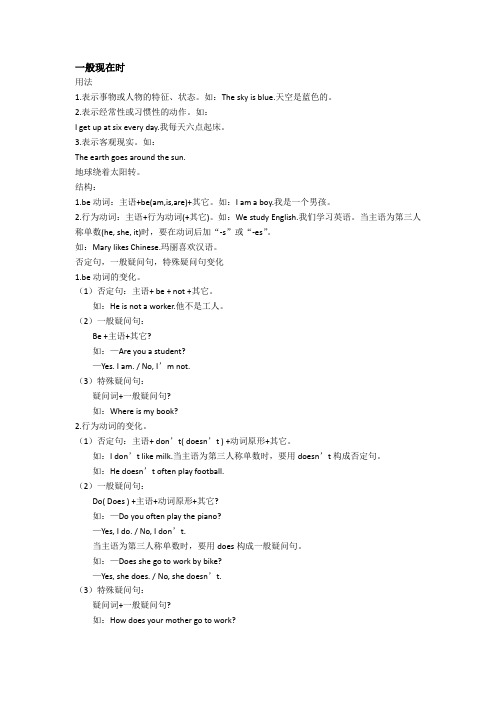
用法1.表示事物或人物的特征、状态。
如:The sky is blue.天空是蓝色的。
2.表示经常性或习惯性的动作。
如:I get up at six every day.我每天六点起床。
3.表示客观现实。
如:The earth goes around the sun.地球绕着太阳转。
结构:1.be动词:主语+be(am,is,are)+其它。
如:I am a boy.我是一个男孩。
2.行为动词:主语+行为动词(+其它)。
如:We study English.我们学习英语。
当主语为第三人称单数(he, she, it)时,要在动词后加“-s”或“-es”。
如:Mary likes Chinese.玛丽喜欢汉语。
否定句,一般疑问句,特殊疑问句变化1.be动词的变化。
(1)否定句:主语+ be + not +其它。
如:He is not a worker.他不是工人。
(2)一般疑问句:Be +主语+其它?如:—Are you a student?—Yes. I am. / No, I’m not.(3)特殊疑问句:疑问词+一般疑问句?如:Where is my book?2.行为动词的变化。
(1)否定句:主语+ don’t( doesn’t ) +动词原形+其它。
如:I don’t like milk.当主语为第三人称单数时,要用doesn’t构成否定句。
如:He doesn’t often play football.(2)一般疑问句:Do( Does ) +主语+动词原形+其它?如:—Do you often play the piano?—Yes, I do. / No, I don’t.当主语为第三人称单数时,要用does构成一般疑问句。
如:—Does she go to work by bike?—Yes, she does. / No, she doesn’t.(3)特殊疑问句:疑问词+一般疑问句?如:How does your mother go to work?一、一般过去时的概念一般过去时表示过去某个时间发生的动作或状态。
六年级英语下册语法知识点总复习人教PEP
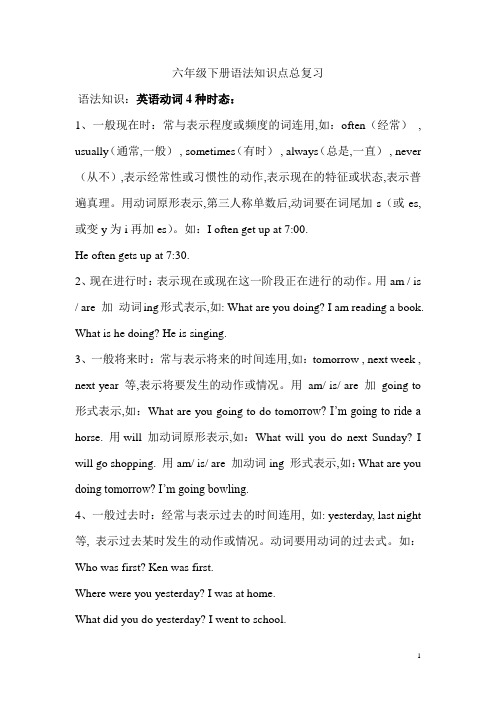
六年级下册语法知识点总复习语法知识:英语动词4种时态:1、一般现在时:常与表示程度或频度的词连用,如:often(经常), usually(通常,一般), sometimes(有时), always(总是,一直), never (从不),表示经常性或习惯性的动作,表示现在的特征或状态,表示普遍真理。
用动词原形表示,第三人称单数后,动词要在词尾加s(或es,或变y为i再加es)。
如:I often get up at 7:00.He often gets up at 7:30.2、现在进行时:表示现在或现在这一阶段正在进行的动作。
用am / is / are 加动词ing形式表示,如: What are you doing? I am reading a book. What is he doing? He is singing.3、一般将来时:常与表示将来的时间连用,如:tomorrow , next week , next year 等,表示将要发生的动作或情况。
用am/ is/ are 加going to 形式表示,如:What are you going to do tom orrow? I’m going to ride a horse. 用will 加动词原形表示,如:What will you do next Sunday? I will go shopping. 用am/ is/ are 加动词ing 形式表示,如:What are you doing tomorrow? I’m going bowling.4、一般过去时:经常与表示过去的时间连用, 如: yesterday, last night 等, 表示过去某时发生的动作或情况。
动词要用动词的过去式。
如:Who was first? Ken was first.Where were you yesterday? I was at home.What did you do yesterday? I went to school.形容词的比较级和最高级:1、单音节词:比较级加er, 最高级加est. 如:tall------taller-------- the tallest,He is taller than his brother. Tom is the tallest in his class.2、多音节词和部分双音节词:比较级加more, 最高级加the most. 如:interesting---------more interesting---------the most interesting,Music is interesting subject. P.E. is more interesting than music.. Science is the most interesting subject.形容词变为比较级的变化规则:(1)一般情况下,在形容词的词尾直接加er。
【英语语法】《PEP小学英语》动词(短语)原形+过去式汇总
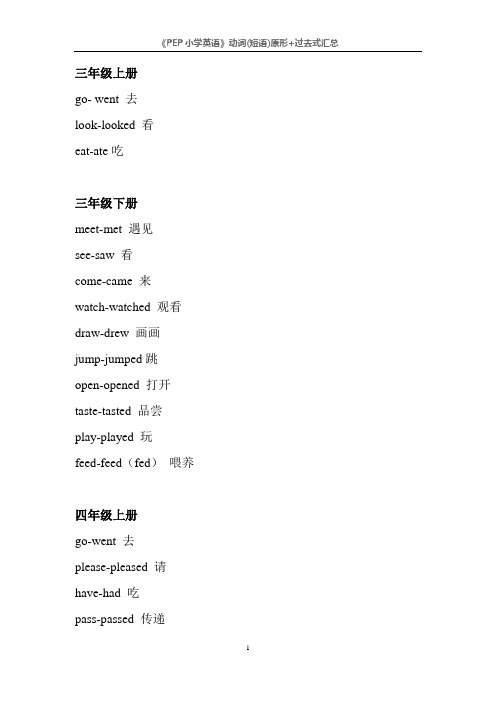
三年级上册go- went 去look-looked 看eat-ate吃三年级下册meet-met 遇见see-saw 看come-came 来watch-watched 观看draw-drew 画画jump-jumped跳open-opened 打开taste-tasted 品尝play-played 玩feed-feed(fed)喂养四年级上册go-went 去please-pleased 请have-had 吃pass-passed 传递use-used 使用四年级下册run-run 跑get up-got up 起床go to school-went to school 去学校go home-went home 回家go to bed-went to bed 上床睡觉wear-wore 穿put on-put on 穿上close-closed 关want-wanted想要take-took 买五年级上册know-knew 知道fun-funned 逗笑wait-waited 等待do homework-did homework 写作业watch-TV-watched TV 看电视read books-read books 看书play-computer-did housework 做家务cook the meals-cooked the meals 做饭empty the trash-emptied the flowers 浇花sweep the floor-swept the floor 扫地clean the bedroom-打扫教室wash the windows-washed the windows 擦窗户make the bed-made the bed铺床set the table-set the table 摆饭桌wash the clothes-washed the clothes 洗衣服do the dishes-did the dishes 洗碗碟put away the clothes-put away the clothes收拾衣服play chess-played chess 下棋tell-told 说work-worked 工作use a computer-used a computer 使用计算机have a try-had a try 试一试五年级下册do morning exercises -did morning exercises 晨练eat breakfast-ate breakfast 吃早饭have English class-had English class 上英语课play sports-played sports 进行体育运动eat dinner-ate dinner 吃晚饭climb mountains-climbed mountains 爬山go shopping-went shopping 购物go hiking-went hiking 去远足play the piano-played the piano 弹钢琴visit grandparent-visited grandparent 看望(外)祖父母fly kites-flew kites 放风筝plant trees-planted tress 种树make a snowman-made a snowman 堆雪人swim-swan 游泳skate-skated 滑冰sleep-slept 睡觉draw pictures-drew pictures 画画cook dinner-cooked dinner 做饭read a book-read a book 看书answer the phone-answered the phone 接电话listen to music-listened the music 听音乐clean the room-cleaned the room 打扫房间write a letter-wrote a letter 写信write an e-mail-wrote a letter 写电子邮件fly-flew 飞jump-jumped 跳run-ran 跑climb-climbed 往上爬fight-fought 打架swing-swang 荡秋千take-took 讲话drink water-drank water喝水send-sent 寄take picture-took pictures 照相watch insects-watched insects 观察昆虫pick up leaves-picked up leaves 采摘树叶do an experiment-did an experiment 做实验catch butterflies-caught butterflies 捉蝴蝶count leaves-collected leaves 收集树叶write a report-wrote a report 写报告play chess-played chess下棋六年级上册go to school-went to school 上学stop-stopped 停get to-got to到达find-found 寻找remember-remembered 记住mean-meant 意思是drive-drove 驾驶buy-bought 购买turn-turned 转弯get off-got off 下车ride a bike-rode a bike 骑自行车dive-dived跳水live-lived 居住teach-taught 教go-went 去play the violin-played the violin 拉小提琴make kites-made kites 制作风筝collect stamps-collected stamps 集邮design-designed 设计say-said 说六年级下册Think-thought 思考study-studied 学习kick-kicked 踢bounce-bounced 反弹go swimming-went swimming 游泳go fishing-went fishing 钓鱼study-studied 学习learn-learned 学习sing-sang唱歌dance-danced 跳舞row-rowed 划(船)go skiing-went skiing 去滑雪leave-left 离开hear-heard 听见trip-tripped 旅行have a fever 发烧hurt-hurt 疼痛have a cold-had a cold 伤风have a toothache-had a toothache 牙疼have a headache-had a headache 头疼have a sore throat-had a sore throat 喉咙疼。
Pep版小学英语六年级下册unit3---一般过去时讲解

Pep版小学英语六年级下册unit3---一般过去时讲解一: 定义表示过去某个时间里发生的动作或存在的状态。
常和表示过去的时间状语连用,如:(a moment, two hours) ago,just now,yesterday,last (week, year, month, day),this morning 等。
如:My brother went to school by bike last term.He was a student four years ago.I watched the moon and ate the moon cakes last Mid-Autumn Festival.Jim went to the supermarket yesterday.二:句子结构(1)Be动词的一般过去时态肯定句:主语+ was/were +其他.否定句:主语+ was/were + not +其他.一般疑问句:Was/Were+主语+其他?特殊疑问句:特殊疑问词+was/were+主语+其他?[注:was用于主语是第一人称单数和第三人称单数时;were用于其他人称] 例:I was born in 1989. 我是1989年出生的。
I was not born in 1989. 我不是1989年出生的。
Were you born in 1989? 你是1989年出生的么?(2)实义动词的一般过去时态肯定句:主语+实义动词过去式+其他.否定句:主语+didn’t+实义动词原形+其他.一般疑问句:Did+主语+实义动词原形+其他?特殊疑问句:特殊疑问词+did+主语+实义动词原形+其他?例:Jim goes home yesterday. 吉姆昨天回家了。
Jim didn’t go home yesterday. 吉姆昨天没有回家。
Did Jim go home yesterday? 吉姆昨天回家了么?What did Jim do yesterday? 吉姆昨天干什么了?三:动词过去式变化规则:1.一般情况下在动词末尾加-ed,如:cook-cooked,listen-listened2. 以e结尾的,在词尾加-d, 如:taste-tasted,like-liked3. 以末尾只有一个辅音字母的重读闭音节,双写末尾的辅音字母,再加-ed,如:stop-stopped,plan-planned4.以“辅音字母+y”结尾的,变y为i,再加-ed,如:study-studied5.不规则动词过去式:过去时练习一、写出下列动词的过去式is\am_________ fly_______ plant________ are ________ drink_________ play____ go________ make _____ ___ does_________ dance_______ worry________ ask _____ taste_________ eat__________ draw________ put ______ throw________ kick_________ pass_______ do ________二、用括号词的适当形式填空1. He (live) in Wuxi two years ago.2. The cat (eat) a bird last night.3. We (have) a party last Halloween.4. Nancy (pick) up oranges on the farm last week.5. I (make) a model ship with Mike yesterday.6. They (play) chess in the classroom last PE lesson.7. My mother (cook) a nice food last Spring Festival.8. The girls (dance) at the party last night.9. I (watch) a cartoon on Saturday last week.10. We (go) to zoo yesterday.11 you (visit) your relatives last Spring Festival?12. Gao Shan (pull) up carrots last National Day holiday.13. What she (do) in the garden last morning?She (catch) a beautiful butterfly.14. They (have) a big lunch last Spring Festival.15. Last summer holiday, I (go) to a party. It (be) fun.16. We all (eat) delicious food last week.17. (do) you go to the zoo last Children’s Day?18. you (have) a good time last night?19. What Nancy (do) last Spring Festival?20. What holiday (come) after Christmas?21. I (watch) a dragon boat race just now.22. I t (be) my birthday yesterday, I (have) a good time.23. The students (go) to the supermarket (by) bus yesterday.24. I’ve (get) a wallet from my grandma.25. you (eat) a lot of delicious food last Spring Festival?26.I ______ (watch) a cartoon on Saturday.27. Her father _______ (read) a newspaper last night.28. We _________ to zoo yesterday, we _____ to the park. (go)29. ______ you _______ (visit) your relatives last Spring Festival?30. ______ he _______ (fly) a kite on Sunday? Yes, he ______.一般过去时练习题一、单项选择:从下列各题后所给的四个选项中选择最佳答案填空。
新版PEP小学六年级英语下Unit2-复习(一般过去时)

What did she do?
She cooked a big meal.
What did he do?
He painted a picture.
Was the man at home yesterday?
No, he wasn’t . He was in the classroom.
Were they in the park?
What did the boy do after school yesterday ?
He played football.
What did he do after class yesterday?
He played basketball.
What did the man read?
He read newspapers.
Yes, they were.
Did the boy play basketball yesterday afternoon?
No, he didn’t . He played football.
Did the man cook breakfast this morning?
Yes, he did.
5. I ____(see) a film with Ann yesterday.
2. She _____ (be) at school this morning.
4. He _____ (do not) live in Guangzhou before 2000.
Exercise
1. _____(be) you busy yesterday afternoon?
Did she…?
Yes, she did.
六年级下册英语动词过去式 人教(PEP)
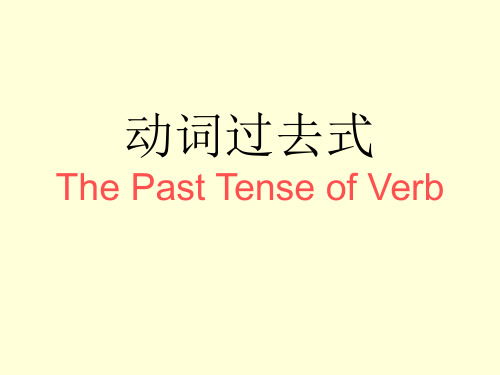
The Past Tense of Verb
一般过去时
定义:
一般过去时表示过去某个时间 里发生的动作或状态;在一般过去 时态中动词通常用动词的过去式来 表示,而动词的过去式是在动词原 形的基础上变化的。动词的过去式 可分为规则动词和不规则动词。
规则动词过去式的变化及读法
规则动词的过去式变化:
尾加t
sleep-slept keep-kept • ⑥含有元音字母o/i的词,将o/i变成a
give-gave sing-sang
不规则动词的过去式
go-went buy-bought see-saw do-did read-read write-wroe take-took
get-got come-came give-gave say-said eat-ate hear-heard find-found
think
thought
drive drove put put throw
threw
eat ate ride rode understand understood
feel felt read read wear
wore
find found run ran
write
wrote
fly flew say said
动词过去式的用法:
• 一般过去时态:表示过去某一时间所发生的动作或存在的状态。动
词要用一般过去式。
过去时的时间标志: yesterday(昨天)last week(上周)last month(上个月) last year(去年)two months ago(两个月前)the day before yesterday(前天)in 1990(在1990年)in those days(在那些日子里)等表示过去的时间状语。
人教版pep小学英语六年级下册单词表带有音标
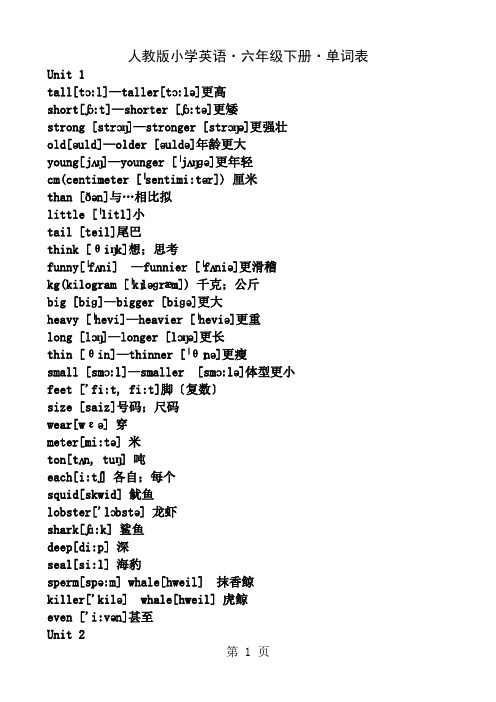
人教版小学英语·六年级下册·单词表Unit 1tall[tɔ:l]—taller[tɔ:lə]更高short[ʃɔ:t]—shorter [ʃɔ:tə]更矮strong [strɔŋ]—stronger [strɔŋə]更强壮old[əuld]—older [əuldə]年龄更大young[jʌŋ]—younger [ˈjʌŋɡə]更年轻cm(centimeter [ˈsentimi:tər]) 厘米than [ðən]与…相比拟little [ˈlitl]小tail [teil]尾巴think [θiŋk]想;思考funny[ˈfʌni] —funnier [ˈfʌniə]更滑稽kg(kilogram [ˈkɪləɡræm]) 千克;公斤big [biɡ]—bigger [biɡə]更大heavy [ˈhevi]—heavier [ˈheviə]更重long [lɔŋ]—longer [lɔŋə]更长thin [θin]—thinner [ˈθɪnə]更瘦small [smɔ:l]—smaller [smɔ:lə]体型更小feet ['fi:t, fi:t]脚〔复数〕size [saiz]号码;尺码wear[wεə] 穿meter[mi:tə] 米ton[tʌn, tuŋ] 吨each[i:tʃ] 各自;每个squid[skwid] 鱿鱼lobster['lɔbstə] 龙虾shark[ʃɑ:k] 鲨鱼deep[di:p] 深seal[si:l] 海豹sperm[spə:m] whale[hweil] 抹香鲸killer['kilə] whale[hweil] 虎鲸even ['i:vən]甚至Unit 2have a fever['fi:və] [hæv ei ˈfi:və]发烧hurt [hə:t] 疼痛have a cold [hæv ə kəuld]感冒have a toothache [hæv ei ˈtu:θˌeɪk]牙疼have a headache [hæv əˈhedeik]头疼have a sore [sɔ:] throat [θrəut]喉咙疼matter['mætə]事情,麻烦sore [sɔ:]疼feel [fi:l]感觉sick[sik] 不舒服;有病hurt[hə:t]疼痛nose[nəuz] 鼻子people['pi:pl] 人们flu[flu:] 流感know[nəu] 知道might [mait]可以;能worry['wʌri, 'wə:ri] 烦恼;担忧medicine['medisin] 药drink [driŋk]饮料stay[stei] 在;逗留better [ˈbetə]更好soon [su:n]立刻;不久tired['taiəd]疲劳,累excited[ik'saitid]兴奋angry['æŋɡri]生气 ;愤怒happy['hæpi]快乐bored[bɔ:d]无聊,烦人sad[sæd]忧伤,悲伤trip[trip] 旅行fail [feil]不及格;失败test [test]测试hear[hiə] 听见;听到match[mætʃ] 比赛between[bi'twi:n] 在…之间pass[pɑ:s, pæs]传递kick[kik] 踢a little [əˈlitl]有些goal[ɡəul] 得分bounce[bauns] 反弹off [ɔf]距;离;离开another[ə'nʌðə] 另一个gues s[ɡes] 猜想win[win]过去式won [wʌn, wəʊn]赢game [ɡeim]比赛laugh [lɑ:f, læf] at 因…而发笑Unit 3watch [wɔtʃ]—watched [wɔtʃt]看wash[wɔʃ]—washed [wɔʃt]洗clean [kli:n]—cleaned[kli:nd]清扫play[pleɪ]—played[pleid]玩visit [ˈvizit]—visited [ˈvizitid]看望do [du:, du, də, d]—did [did]last [lɑ:st]上一个weekend[ˌwi:kˈend]周末cook[kuk]—cooked [kukt]做〔饭〕go [ɡəu]—went[went]去to[tu:,tu,tə]向;朝park[pɑ:k]公园go swimming [ɡəu ˈswɪmɪŋ]—went[went] swimming去游泳read[ri:d]—read [red] 读go fishing—went fishing[ˈfɪʃɪŋ]去钓鱼go hiking—went hiking [haikɪŋ]去郊游yesterday['jestədi,-dei] 昨天study['stʌdi]过去式 studied[ˈstʌdi:d]学习tongue twister [tʌŋˈtwɪstə]绕口令fly[flai]过去式 flew [flu:]飞return[[ri'tə:n]] 送回;归还swim[swim]过去式 swam[swæm]游泳Unit 4learn[lə:n]—learned [ˈlə:nid] 学习Chinese [tʃaɪˈni:z, -ˈni:s]中文;汉语sing[siŋ] —sang[sæŋ] 唱歌and [ænd, ənd, ən]与dance[dɑ:ns, dæns]—danced[dɑ:nst]跳舞eat[i:t]—ate[et,eit] 吃good [ɡud]好take [teik]—took[tuk] 照;拍climb [klaim]—climbed [klaimd]爬have [hæv, həv, əv, v]—had [hæd]cousin [ˈkʌzn]堂表兄弟;堂表姐妹I’ll=I will [wil]buy[bai]—bought[bɔ:t] 买present [ˈprezənt]礼物row[rəu]—rowed[rəud]划船aboat [bəut]小船see[si:]—saw[sɔ:] 看elephant [ˈelifənt]大象go skiing[ˈski:ɪŋ]—went skiing 去滑雪go ice-skating [ais ˈskeɪtɪŋ]—went ice-skating 去滑冰how [hau]怎么,如何get [ɡet]—got [gɔt]到达last [lɑ:st] [læst]上一个,仅余,留在最后relax[ri'læks]放松prepare[pri'pεə] 准备。
